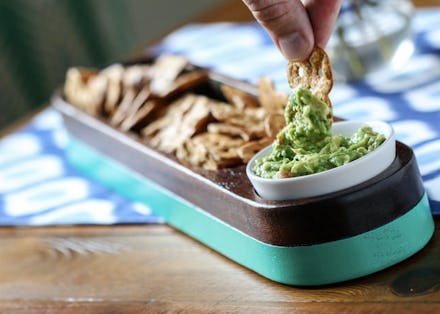Your Double-Dipping Habit Is Actually Pretty Disgusting

Plunging a half-eaten chip back into a bowl of salsa may feel like second nature, but the habit isn't as innocuous as it may seem.
So, apologies, but in today's edition of bummer-news-you-may-wish-to-ignore, we explore the the dirty truth about the inglorious act of double-dipping. A group of researchers, whose findings were published in the Journal of Food Safety in 2009, found that biting a chip or cracker and then scooping it back into a dip really does add mouth bacteria to the spread, whether that spread be salsa, chocolate sauce or cheese (no, not even your fondue is safe).
The good news: The researchers found one small caveat. Post-double dip, chocolate and cheese dipping sauces were contaminated with fewer bacteria than the salsa. The salsa's bacteria level did drop to a comparable number to the other dips after being left out for two hours, however. Does this mean you should linger around the snack table for 120 minutes before diving in? Eh, we're not sure.
The bacteria in the salsa eventually dwindled due to the dip's acidity: Most bacteria don't survive in acid for long.
The viscosity (thickness) of the dips caused the initial bacteria disparity:
"Chocolate and cheese dips are both pretty thick," the Conversation reported. "Salsa isn't as thick. The lower viscosity means that more of the dip touching the bitten cracker falls back into the dipping bowl rather than sticking to the cracker. And as it drops back into the communal container, it brings with it bacteria from the mouth of the double-dipper."
Science is pretty much telling you to eat more fondue, it appears.
Back to the ick-factor: Should you quit your double-dipping habit once and for all? While most oral bacteria isn't harmful, certain diseases, including SARS and the flu, have the potential to spread through saliva. Your best bet is to pour some of the communal dip into your own personal serving bowl, so you can double-, triple- and quadruple-dip until the cows come home.